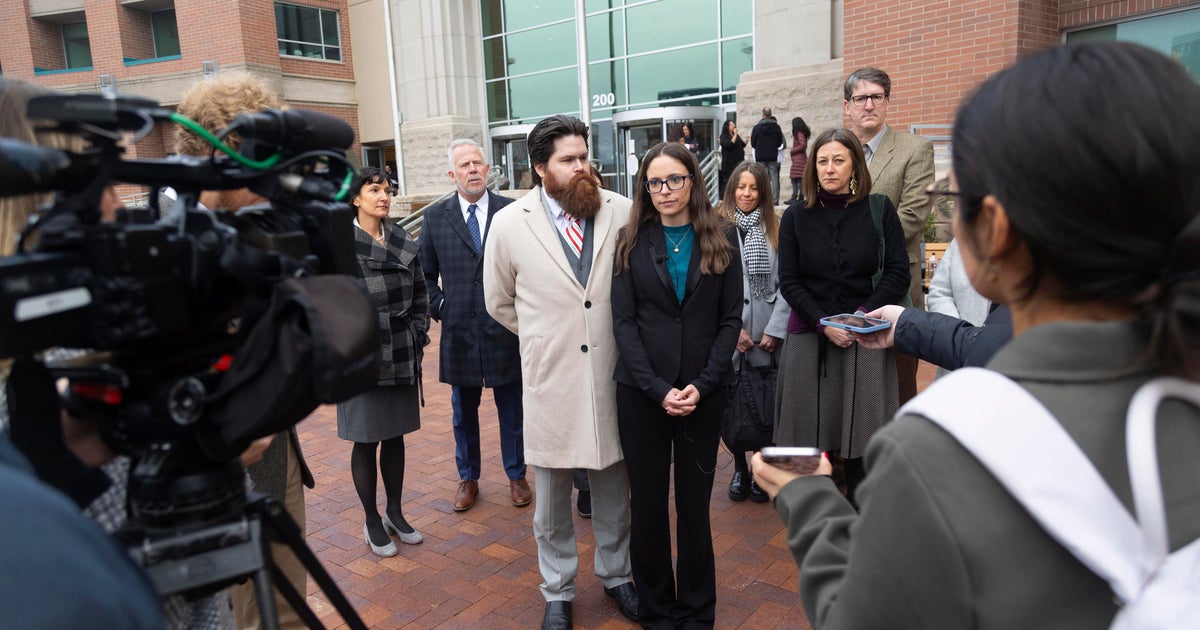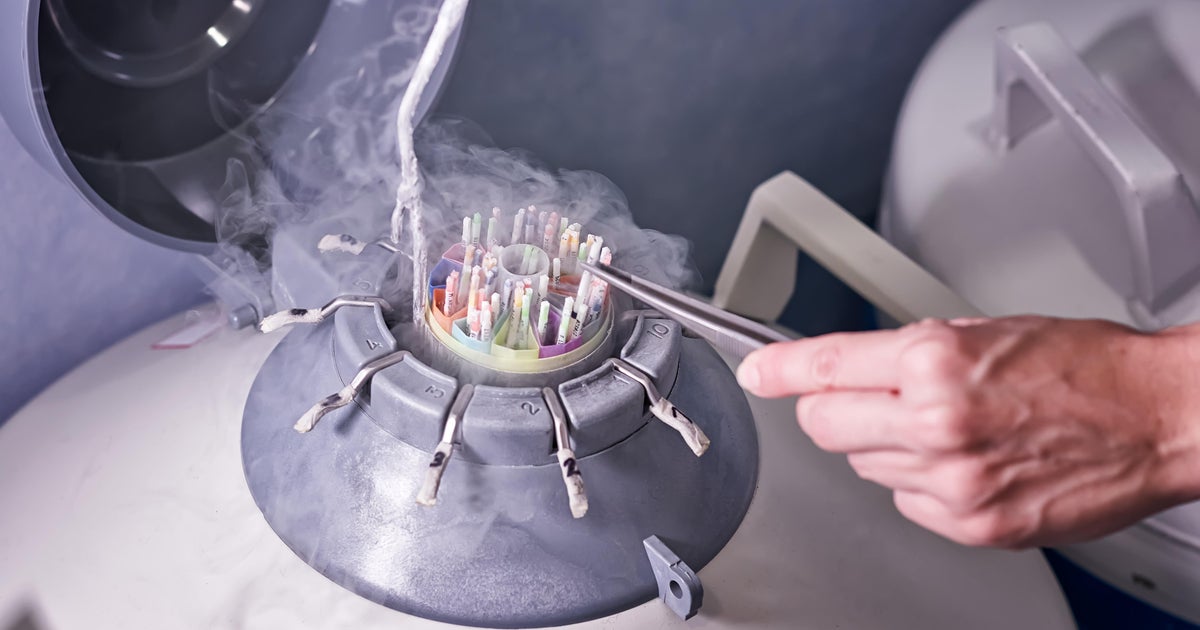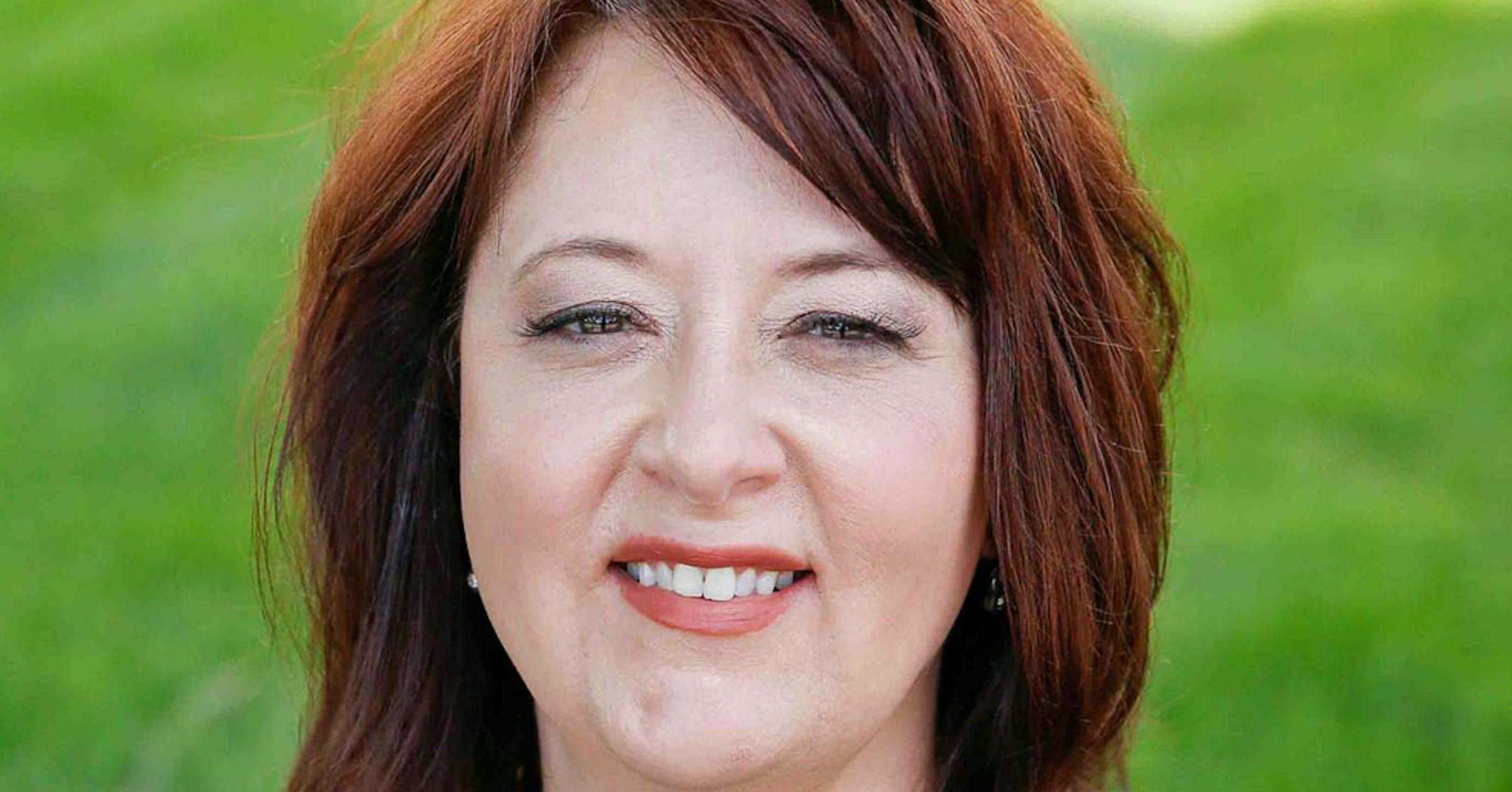CBS News
Pay first, deliver later: Some women are being asked to prepay for their baby

In April, just 12 weeks into her pregnancy, Kathleen Clark was standing at the receptionist window of her OB-GYN’s office when she was asked to pay $960, the total the office estimated she would owe after she delivered.
Clark, 39, was shocked that she was asked to pay that amount during this second prenatal visit. Normally, patients receive the bill after insurance has paid its part, and for pregnant women that’s usually only when the pregnancy ends. It would be months before the office filed the claim with her health insurer.
Clark said she felt stuck. The Cleveland, Tennessee, obstetrics practice was affiliated with a birthing center where she wanted to deliver. Plus, she and her husband had been wanting to have a baby for a long time. And Clark was emotional, because just weeks earlier her mother had died.
“You’re standing there at the window, and there’s people all around, and you’re trying to be really nice,” recalled Clark, through tears. “So, I paid it.”
On online baby message boards and other social media forums, pregnant women say they are being asked by their providers to pay out-of-pocket fees earlier than expected. The practice is legal, but patient advocacy groups call it unethical. Medical providers argue that asking for payment up front ensures they get compensated for their services.
How frequently this happens is hard to track because it is considered a private transaction between the provider and the patient. Therefore, the payments are not recorded in insurance claims data and are not studied by researchers.
Patients, medical billing experts, and patient advocates say the billing practice causes unexpected anxiety at a time of already heightened stress and financial pressure. Estimates can sometimes be higher than what a patient might ultimately owe and force people to fight for refunds if they miscarry or the amount paid was higher than the final bill.
Up-front payments also create hurdles for women who may want to switch providers if they are unhappy with their care. In some cases, they may cause women to forgo prenatal care altogether, especially in places where few other maternity care options exist.
It’s “holding their treatment hostage,” said Caitlin Donovan, a senior director at the Patient Advocate Foundation.
Medical billing and women’s health experts believe OB-GYN offices adopted the practice to manage the high cost of maternity care and the way it is billed for in the U.S.
When a pregnancy ends, OB-GYNs typically file a single insurance claim for routine prenatal care, labor, delivery, and, often, postpartum care. That practice of bundling all maternity care into one billing code began three decades ago, said Lisa Satterfield, senior director of health and payment policy at the American College of Obstetricians and Gynecologists. But such bundled billing has become outdated, she said.
Previously, pregnant patients had been subject to copayments for each prenatal visit, which might lead them to skip crucial appointments to save money. But the Affordable Care Act now requires all commercial insurers to fully cover certain prenatal services. Plus, it’s become more common for pregnant women to switch providers, or have different providers handle prenatal care, labor, and delivery — especially in rural areas where patient transfers are common.
Some providers say prepayments allow them to spread out one-time payments over the course of the pregnancy to ensure that they are compensated for the care they do provide, even if they don’t ultimately deliver the baby.
“You have people who, unfortunately, are not getting paid for the work that they do,” said Pamela Boatner, who works as a midwife in a Georgia hospital.
While she believes women should receive pregnancy care regardless of their ability to pay, she also understands that some providers want to make sure their bill isn’t ignored after the baby is delivered. New parents might be overloaded with hospital bills and the costs of caring for a new child, and they may lack income if a parent isn’t working, Boatner said.
In the U.S., having a baby can be expensive. People who obtain health insurance through large employers pay an average of nearly $3,000 out-of-pocket for pregnancy, childbirth, and postpartum care, according to the Peterson-KFF Health System Tracker. In addition, many people are opting for high-deductible health insurance plans, leaving them to shoulder a larger share of the costs. Of the 100 million U.S. people with health care debt, 12% attribute at least some of it to maternity care, according to a 2022 KFF poll.
Families need time to save money for the high costs of pregnancy, childbirth, and child care, especially if they lack paid maternity leave, said Joy Burkhard, CEO of the Policy Center for Maternal Mental Health, a Los Angeles-based policy think tank. Asking them to prepay “is another gut punch,” she said. “What if you don’t have the money? Do you put it on credit cards and hope your credit card goes through?”
Calculating the final costs of childbirth depends on multiple factors, such as the timing of the pregnancy, plan benefits, and health complications, said Erin Duffy, a health policy researcher at the University of Southern California’s Schaeffer Center for Health Policy and Economics. The final bill for the patient is unclear until a health plan decides how much of the claim it will cover, she said.
But sometimes the option to wait for the insurer is taken away.
During Jamie Daw’s first pregnancy in 2020, her OB-GYN accepted her refusal to pay in advance because Daw wanted to see the final bill. But in 2023, during her second pregnancy, a private midwifery practice in New York told her that since she had a high-deductible plan, it was mandatory to pay $2,000 spread out with monthly payments.
Daw, a health policy researcher at Columbia University, delivered in September 2023 and got a refund check that November for $640 to cover the difference between the estimate and the final bill.
“I study health insurance,” she said. “But, as most of us know, it’s so complicated when you’re really living it.”
While the Affordable Care Act requires insurers to cover some prenatal services, it doesn’t prohibit providers from sending their final bill to patients early. It would be a challenge politically and practically for state and federal governments to attempt to regulate the timing of the payment request, said Sabrina Corlette, a co-director of the Center on Health Insurance Reforms at Georgetown University. Medical lobbying groups are powerful and contracts between insurers and medical providers are proprietary.
Because of the legal gray area, Lacy Marshall, an insurance broker at Rapha Health and Life in Texas, advises clients to ask their insurer if they can refuse to prepay their deductible. Some insurance plans prohibit providers in their network from requiring payment up front.
If the insurer says they can refuse to pay up front, Marshall said, she tells clients to get established with a practice before declining to pay, so that the provider can’t refuse treatment.
Clark said she met her insurance deductible after paying for genetic testing, extra ultrasounds, and other services out of her health care flexible spending account. Then she called her OB-GYN’s office and asked for a refund.
“I got my spine back,” said Clark, who had previously worked at a health insurer and a medical office. She got an initial check for about half the $960 she originally paid.
In August, Clark was sent to the hospital after her blood pressure spiked. A high-risk pregnancy specialist — not her original OB-GYN practice — delivered her son, Peter, prematurely via emergency cesarean section at 30 weeks.
It was only after she resolved most of the bills from the delivery that she received the rest of her refund from the other OB-GYN practice.
This final check came in October, just days after Clark brought Peter home from the hospital, and after multiple calls to the office. She said it all added stress to an already stressful period.
“Why am I having to pay the price as a patient?” she said. “I’m just trying to have a baby.”
KFF Health News is a national newsroom that produces in-depth journalism about health issues and is one of the core operating programs at KFF—an independent source of health policy research, polling, and journalism. Learn more about KFF.
Subscribe to KFF Health News’ free Morning Briefing.
This article first appeared on KFF Health News and is republished here under a Creative Commons license.
CBS News
Democratic senators ask Pentagon and DOJ to investigate any Elon Musk contact with Putin and other top Russians

Two top Democratic senators are asking the Pentagon and the Justice Department to investigate billionaire Trump ally Elon Musk’s reported contacts with Russian President Vladimir Putin and other top Russian officials in recent years.
Sen. Jack Reed, chairman of the Senate Armed Services Committee, and Sen. Jeanne Shaheen, a top member of the Senate Armed Services and Foreign Relations Committees, wrote a letter to Defense Department Inspector General Robert Storch and Attorney General Merrick Garland Friday, urging them to determine whether Musk’s reported contacts with the Russians should force a review of the federal government’s contracts with his company, SpaceX. Reuters was first to report the request.
The Wall Street Journal reported in October that Musk has been in regular contact with Putin since late 2022, and that Putin asked Musk to activate his Starlink satellite internet program over Taiwan for Chinese President Xi Jinping. SpaceX did not immediately respond to a request for comment.
Shaheen and Reed expressed concern that giving a security clearance to someone with a reported history of Russian communications could pose a national security risk.
“These relationships between a well-known U.S. adversary and Mr. Musk, a beneficiary of billions of dollars in U.S. government funding, pose serious questions regarding Mr. Musk’s reliability as a government contractor and a clearance holder,” the senators wrote.
The world’s richest man has become a close ally of President-elect Donald Trump in recent months, giving over $130 million to help elect him, campaigning and traveling with him, and weighing in on Cabinet picks. Trump announced earlier this week that he’s tapping Musk and businessman Vivek Ramaswamy to lead a new Department of Government Efficiency.
CBS News also reported Friday that Musk recently met with Iran’s ambassador to the U.N., Amir Saeid Iravani, at the ambassador’s residence in New York, according to two sources familiar with the meeting. The U.S. does not have diplomatic relations with Iran.
The senators also sent a separate letter to Air Force Secretary Frank Kendall, expressing their concern that the Space Force’s reliance on SpaceX could also affect national security.
and
contributed to this report.
CBS News
Man accused of killing Georgia nursing student Laken Riley “went hunting for females,” prosecutor says

A Venezuelan man “went hunting for females on the University of Georgia’s campus” earlier this year and ended up killing nursing student Laken Riley after a struggle, a prosecutor said Friday. The man’s lawyer, though, said the evidence is circumstantial and doesn’t prove his client is guilty.
Jose Ibarra, who entered the U.S. illegally, is charged with murder in the February killing, which helped fan the immigration debate during this year’s presidential campaign. Ibarra waived his right to a jury trial, meaning his case is being heard and decided by Athens-Clarke County Superior Court Judge H. Patrick Haggard.
Prosecutor Sheila Ross told the judge that Ibarra encountered Riley Feb. 22 while she was running on the University of Georgia campus in Athens. Riley, 22, was a student at Augusta University College of Nursing, which also has a campus in the city that is about 70 miles east of Atlanta.
“When Laken Riley refused to be his rape victim, he bashed her skull in with a rock repeatedly,” Ross said, adding that the evidence would show that Riley “fought for her life, for her dignity.”
As a result of that fight, Ibarra’s DNA was left under her fingernails, Ross said. Riley called 911 and, in a struggle over her phone, Ibarra’s thumbprint was left on the screen, she said.
That forensic evidence is sufficient to prove Ibarra’s guilt, but digital and video evidence also prove that Ibarra killed Riley, the prosecutor said.
Augusta University
Defense attorney Dustin Kirby called the evidence in the case graphic and disturbing, but he said none of it proves that his client killed Riley.
“The evidence in this case is very good that Laken Riley was murdered,” he said. “The evidence that Jose Ibarra killed Laken Riley is circumstantial.”
The killing added fuel to the national debate over immigration when federal authorities said Ibarra illegally entered the U.S. in 2022 and was allowed to stay to pursue his immigration case.
Republicans, including President-elect Donald Trump, blamed Democratic President Joe Biden’s border policies for her death. As he spoke about border security during his State of the Union address weeks after the killing, Biden mentioned Riley by name.
ELIJAH NOUVELAGE/AFP via Getty Images
Riley’s mother, Allyson Phillips, and other family members packed the courtroom Friday morning but didn’t return after lunch. Phillips put her face in her hands and cried frequently, especially when photos of her daughter were shown and during descriptions of what happened to her.
Ibarra, dressed in a plaid shirt and dark slacks and with his feet chained, wore headphones to hear a Spanish-language interpreter. He appeared attentive, sometimes looking up when photos or video were shown and other times looking down at his lap.
During her opening statement, Ross laid out a timeline using doorbell and surveillance camera footage, as well as data from Riley’s phone and watch, to piece together her final moments.
Riley left home at 9:03 a.m. and headed for wooded trails where she often ran. Data from her watch shows that at 9:10 a.m., she was running at a fast pace when something happened that made her “stop dead in her tracks.” She called 911 at 9:11 a.m.
A 911 dispatcher answered but no one responded when she repeatedly sought a response, and then the call was ended by the caller. The dispatcher immediately called back, but no one answered.
“Her encounter with him was long. Her fight with him was fierce,” Ross said, noting that Riley’s watch data showed her heart was still beating until 9:28 a.m.
Ross also played security camera video that shows a man she said is Ibarra at 9:44 a.m. in a parking lot at his apartment complex. The man tossed something in a recycling bin and then appeared to throw something in nearby bushes. In the recycling bin, officers found a dark hooded jacket with blood that turned out to be Riley’s on it and strands of long dark hair caught on a button. In the bushes, they found black disposable kitchen gloves, one of which had a hole in the tip of the thumb.
Another video from about 35 minutes later shows what appeared to be the same man wearing different clothes and walking toward a trash bin with a bag and then walking back empty-handed. That bin was emptied before police were able to search it.
One of Riley’s three roommates testified that she became worried when Riley didn’t return from a run. The four friends used a phone app to track each other’s whereabouts, and Lilly Steiner testified that she became more worried when she saw that Riley’s phone showed her in the same location for a long time.
Riley often talked to her mother by phone when she ran, and her mother also became concerned that morning when her daughter didn’t answer her calls.
Steiner and another roommate, Sofia Magana, walked to the trail where the phone app indicated Riley was located. They found what they believed was one of Riley’s earbuds on the trail and returned home to call police.
One of the officers who responded found Riley’s body partially covered by leaves, 64 feet off the trail. Although her shirt had been pulled up and her underwear was showing above the lowered waistband of her running tights, Ross said there was no evidence that Riley had been sexually assaulted.
Police arrested Ibarra the day after the killing.
Before Ross played video from the body camera of the officer who found Riley, she warned Riley’s family that her dead body would be shown. Riley’s mother left the courtroom, but other family members and friends remained, some of them crying or covering their faces during the video.
Ibarra is charged with one count of malice murder, three counts of felony murder and one count each of kidnapping, aggravated assault, aggravated battery, hindering an emergency telephone call, tampering with evidence and being a peeping Tom.
Prosecutors say that on the day of Riley’s killing, Ibarra peered into the window of an apartment in a university residential building, which is the basis for the peeping Tom charge.
CBS News
Texas court clears way for controversial execution of Robert Roberson

Watch CBS News
Be the first to know
Get browser notifications for breaking news, live events, and exclusive reporting.











